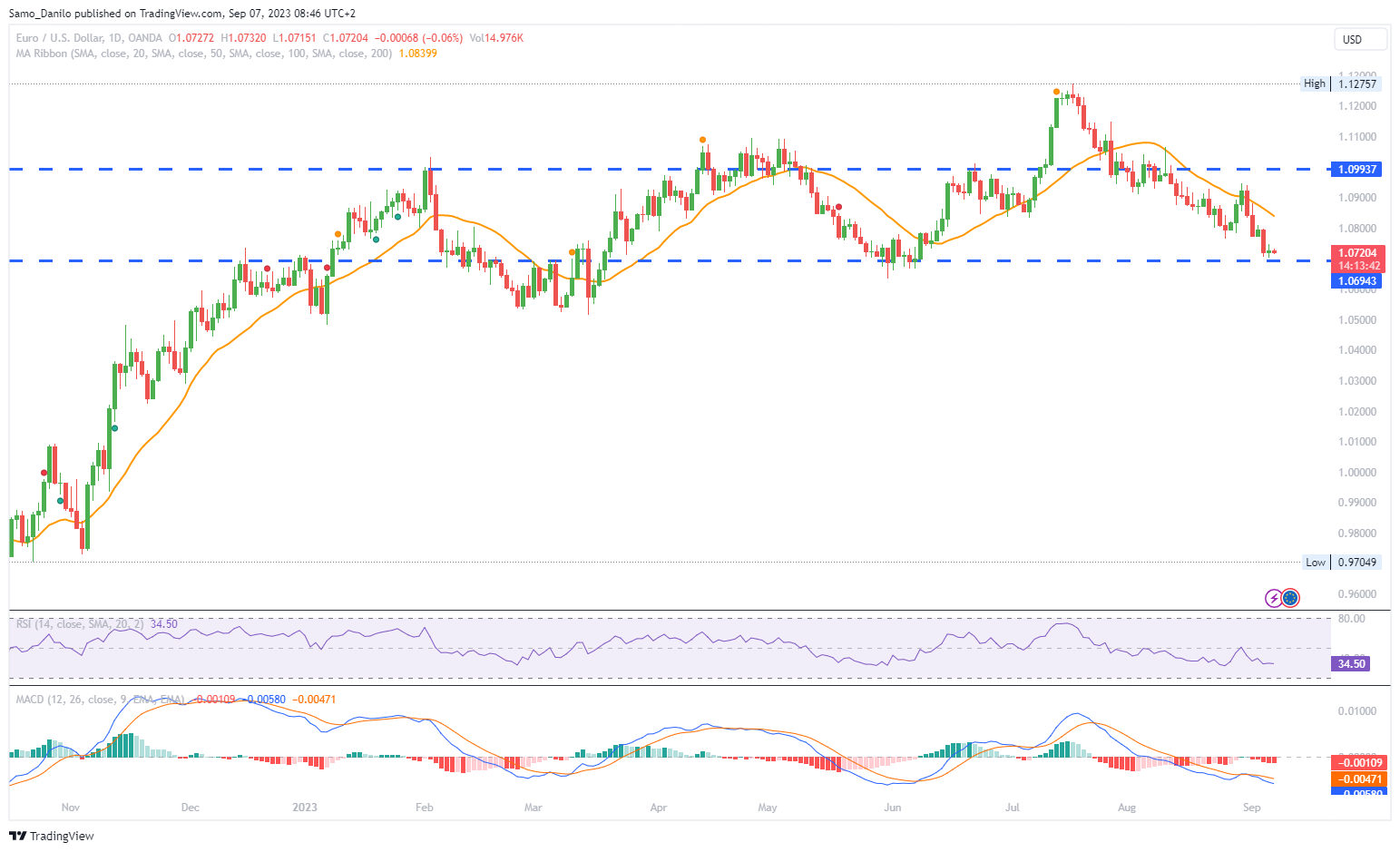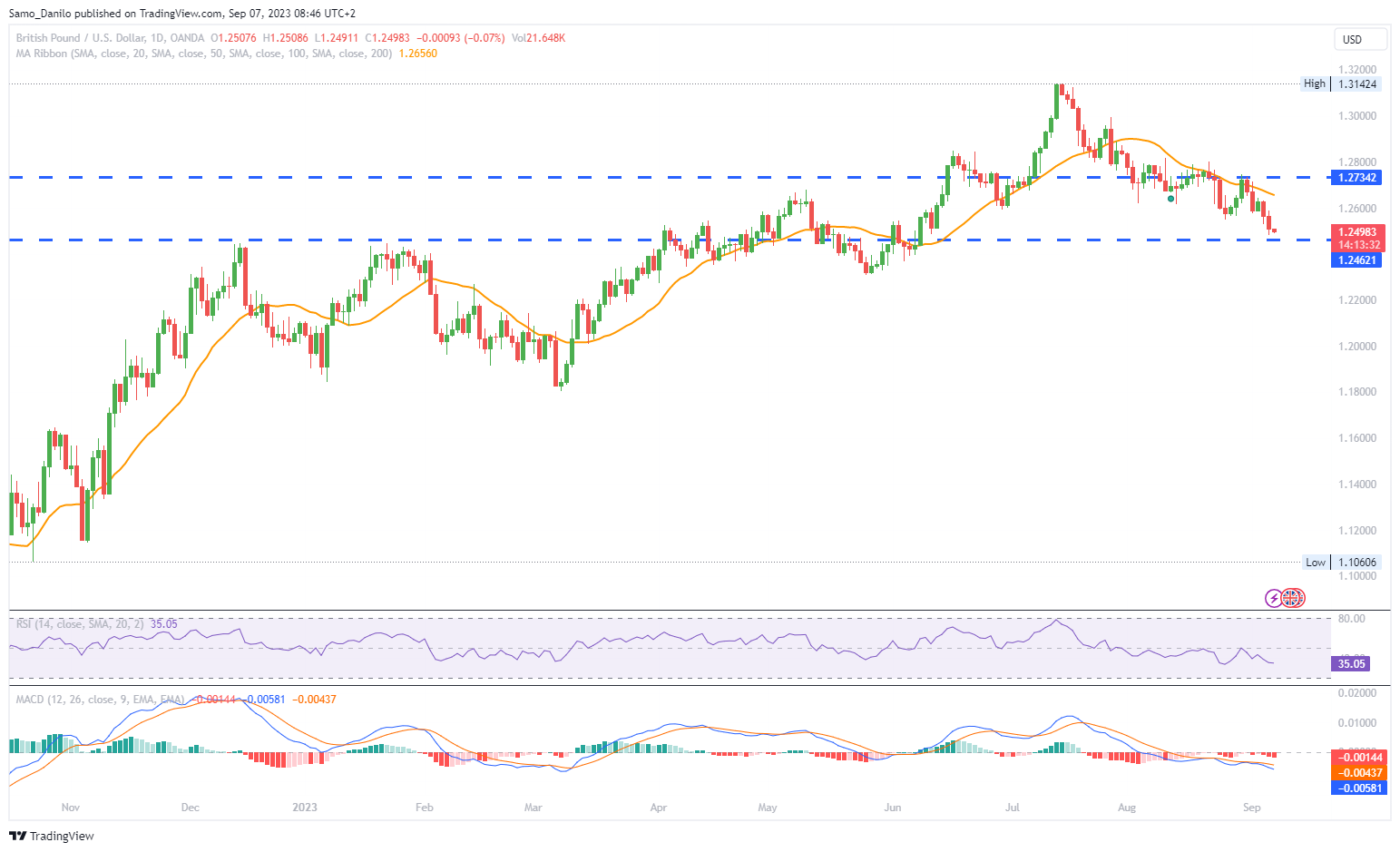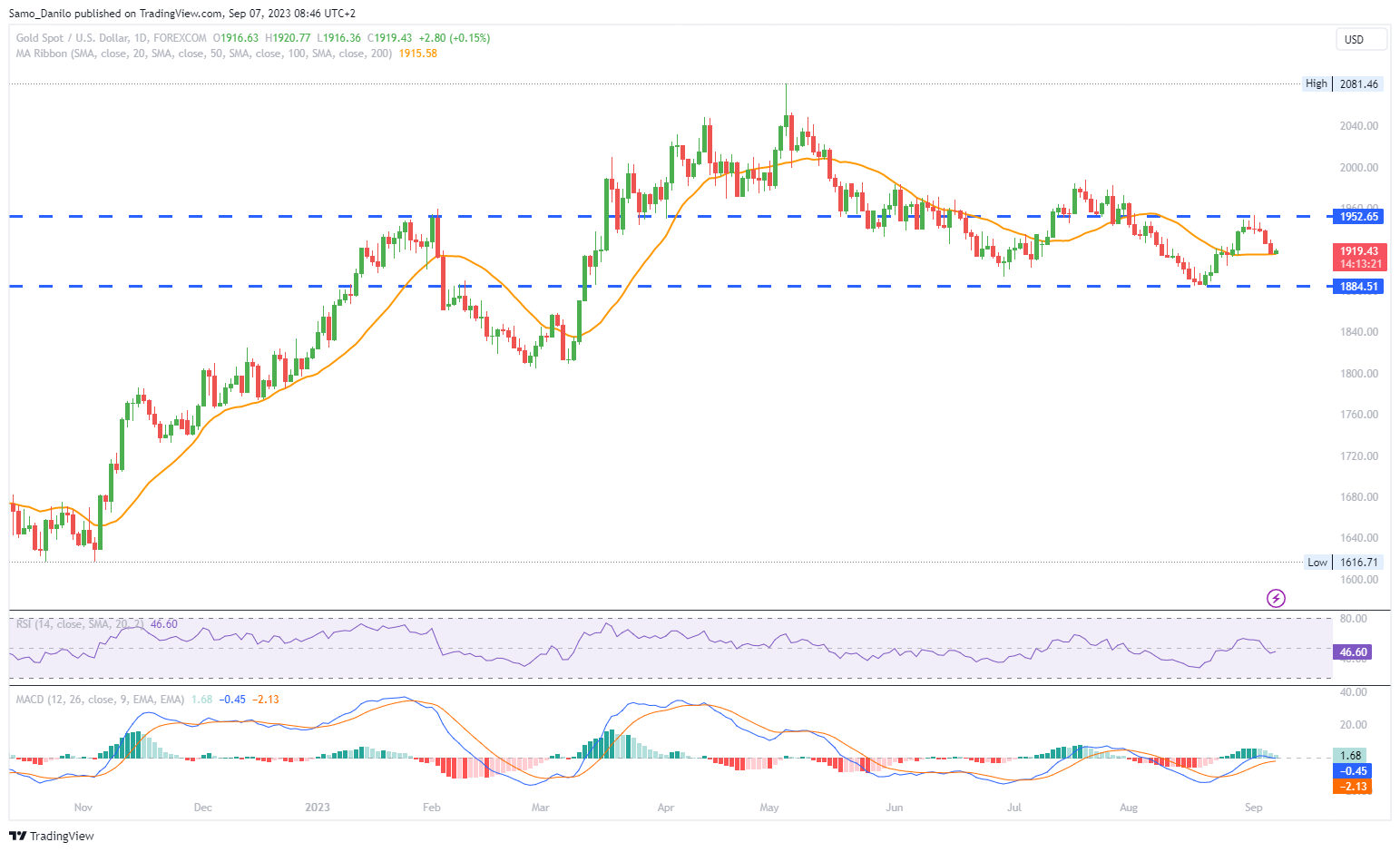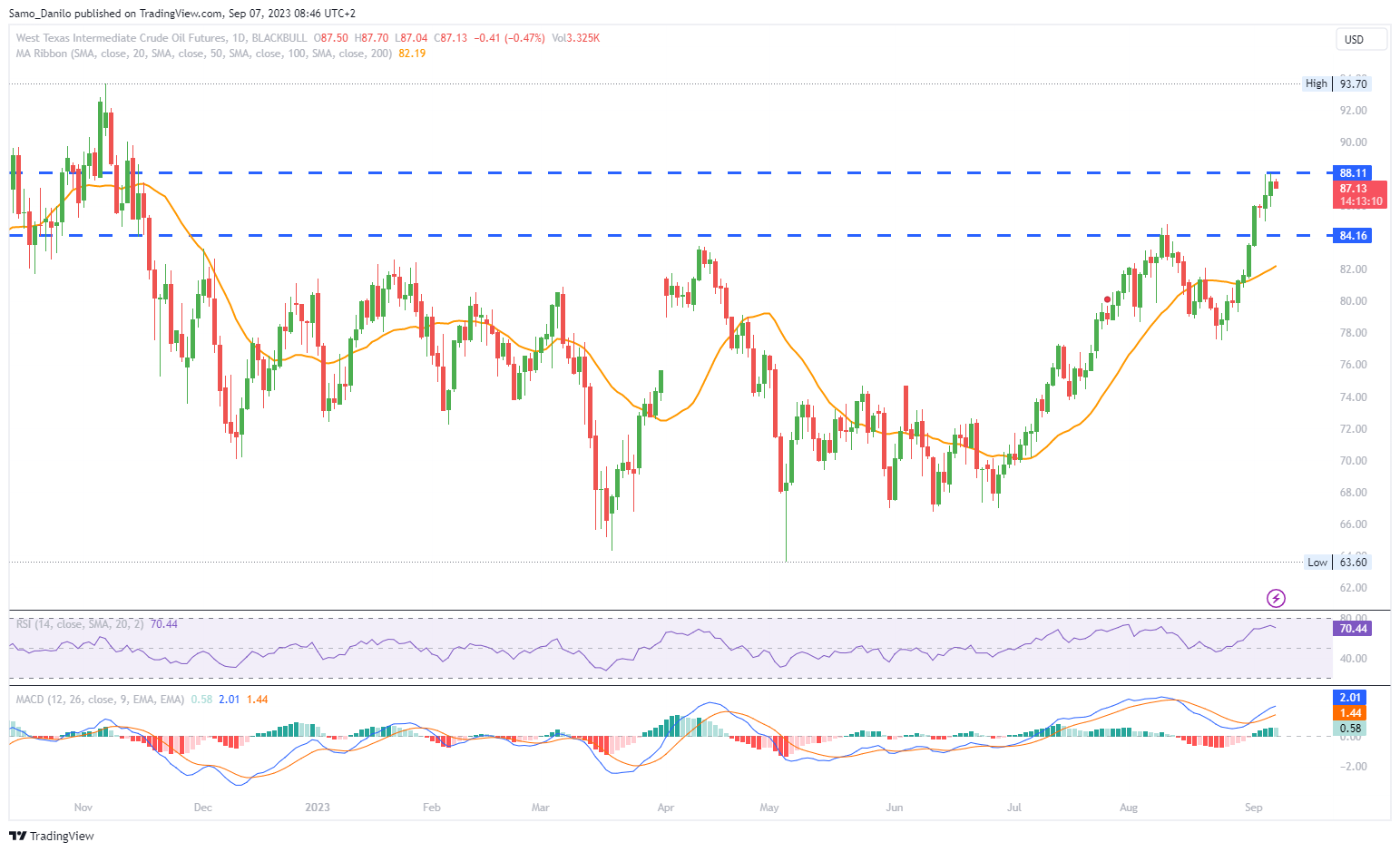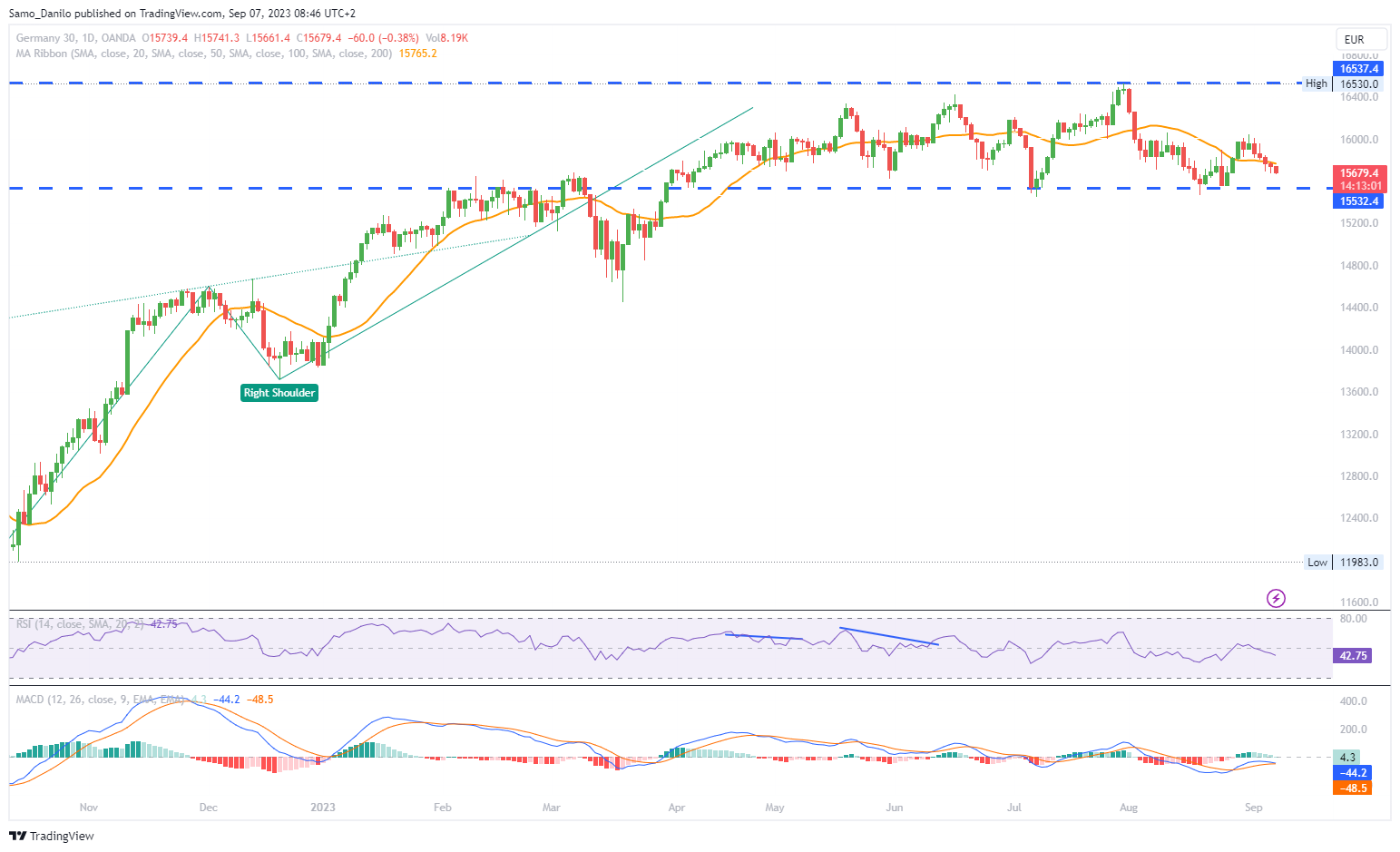EURUSD
- EUR/USD retreated on Wednesday, falling to a three-month low around the 1.0700 handle. This decline was primarily attributed to strong U.S. economic data, which increased the probability of additional tightening of monetary policy by the Federal Reserve in 2023.
- The EUR/USD pair initiated a rapid descent last week, breaking below its 200-day moving average and continuing to weaken. It reached its weakest level since June during the observed period.
- Economic data from the Eurozone contributed to the euro's decline. German Factory Orders, a key indicator, showed a significant decline of 11.7% in July. Additionally, Eurozone Retail Sales for the same month saw a 0.2% decline. These figures raise doubts about the European Central Bank's (ECB) next steps, especially considering that the ECB's Governing Council is scheduled to meet next week.
- In contrast, data from the United States showed strength in the services sector. The ISM non-manufacturing Purchasing Managers' Index (PMI) indicated robust growth in the U.S. services sector in August, rising to 54.5, surpassing expectations of 52.5. This was the highest reading since February.
Closing statement: The EUR/USD pair hit a three-month low due to strong U.S. economic data and concerns about the Eurozone's economic outlook. Weak German Factory Orders and Eurozone Retail Sales figures have raised questions about the ECB's future monetary policy actions. The robust performance of the U.S. services sector added further support to the U.S. dollar.
GBPUSD
- GBP/USD dropped to its weakest level since mid-June, falling below 1.2530 during the observed period. However, it closed the day near 1.2550 on Tuesday.
- The British Pound came under pressure due to comments made by Bank of England (BoE) Governor Andrew Bailey. Bailey mentioned that the BoE is much closer to ending its hiking cycle, signaling a dovish stance on monetary policy.
- During Bailey's testimony to Parliament, he and two members of the Monetary Policy Committee (MPC) expressed concerns that further tightening of monetary policy could potentially lead to an unnecessarily severe economic recession. These remarks added to the dovish sentiment.
- The UK's FTSE 100 index opened in negative territory on Wednesday, losing nearly 1% on the day. This reflected a sour mood in the market.
- Unless there is a noticeable improvement in risk sentiment, the US Dollar could continue to maintain its strength and potentially limit GBP/USD's recovery attempts.
| SMA (20) | Falling |
|
|
| RSI (14) | Slightly Falling |
| |
| MACD (12, 26, 9) | Neutral |
Closing statement: GBP/USD reached its lowest level since mid-June, driven by dovish comments from BoE Governor Andrew Bailey and concerns about the potential impact of further tightening of monetary policy. The negative sentiment also extended to the FTSE 100 index. The US Dollar's strength remained a key factor influencing the currency pair's movement.
GOLD
- Gold price extended its five-day losing streak, reaching fresh one-week lows at $1,915. It tested the confluence support of the 21- and 200-Daily Moving Averages (DMA) at $1,916.
- The Federal Reserve (Fed) reinforced the case for a restrictive monetary policy stance over an extended period. This reinforced a rising trend in U.S. Treasury yields. The 2-year yield comfortably broke above the 5.0% threshold.
- The announcement of the ISM non-manufacturing PMI number suggested that the U.S. economy remains remarkably resilient. Sturdy demand pressures may prevent inflation from slowing materially towards the Fed's 2.0% target in the coming months.
- Although the Fed has pledged to "proceed carefully," upside surprises in macroeconomic indicators could prompt policymakers to reevaluate their cautious approach. This could potentially lead them to contemplate additional interest rate hikes in 2023.
- The future price action of Gold will depend on upcoming data, including US weekly Jobless Claims, and a series of speeches from Federal Reserve policymakers. These events will provide fresh cues regarding the central bank's stance on interest rates.
| SMA (20) | Neutral | ||
| RSI (14) | Neutral | ||
| MACD (12, 26, 9) | Neutral |
Closing statement: Gold faced downward pressure, extending its losing streak amid the Fed's indication of a restrictive monetary policy stance. Strong U.S. economic indicators and rising Treasury yields contributed to this bearish sentiment. The upcoming data and Federal Reserve speeches will be closely monitored for further insights into the central bank's interest rate decisions.
CRUDE OIL
- Crude oil prices experienced a decline on Thursday, influenced by several factors. These included concerns over demand due to the approaching winter season and an uncertain economic outlook for China. These factors outweighed expectations of tighter supplies resulting from extended production cuts in Saudi Arabia and Russia.
- China's economic data provided mixed signals. While overall exports fell by 8.8% in August year-on-year and imports contracted by 7.3%, crude oil imports surged by 30.9% year-on-year. This mixed data had an impact on oil prices, reflecting uncertainties in the market.
- There were concerns over the potential for increased oil output from countries like Iran and Venezuela. This increased output could potentially offset a portion of the production cuts implemented by Saudi Arabia and Russia, keeping a lid on oil prices.
- On a positive note, U.S. crude oil inventories were projected to have fallen by 5.5 million barrels in the week ending September 1, according to American Petroleum Institute (API) figures.
- Official inventory data from the U.S. Energy Information Administration are coming out later today.
| SMA (20) | Rising |
|
|
| RSI (14) | Slightly Rising |
|
|
| MACD (12, 26, 9) | Rising |
|
|
Closing statement: Crude oil prices eased as concerns over demand and an uncertain economic outlook for China offset expectations of tighter supplies from extended production cuts by major oil-producing nations. Mixed economic data from China and concerns over increased oil output from other countries contributed to the overall market uncertainty. Additionally, positive inventory data provided some support to oil prices, but the market remained cautious about the future direction of prices.
DAX
- German industrial production fell by 0.8% in July, surpassing expectations for a 0.5% drop. This decline followed a revised 1.4% fall in the previous month. These figures contribute to growing concerns about the economic performance of Germany, which is not only the largest economy in the Eurozone but also a significant driver of regional growth.
- The retail sector in Germany maintained its performance, showing a consistent decline of 1% against an expected decline of 1.2%. However, on a monthly basis, the sector reported a decline of 0.2%, in contrast to the previous month's 0.2% growth.
- Investor sentiment regarding the European Central Bank (ECB) remains divided ahead of the upcoming policy decision. Some market participants are closely monitoring the statements and perspectives of ECB officials to gauge the likelihood of policy changes.
- Klaas Knot, a member of the ECB Governing Council, shared his perspective with Bloomberg, suggesting that market participants might be underestimating the likelihood of an interest rate hike in the upcoming week. This statement adds to the uncertainty surrounding ECB policy decisions.
- Investors are likely to keep a close watch on upcoming data releases, including the final readings of Eurozone Gross Domestic Product (GDP) for the second quarter (Q2). These data points could provide further insights into the economic health of the Eurozone.
| SMA (20) | Neutral |
| RSI (14) | Neutral |
| MACD (12, 26, 9) | Neutral |
Closing statement: The DAX index faced headwinds as German industrial production declined more than expected in July, raising concerns about the overall economic performance of Germany and the Eurozone. The retail sector showed resilience on a year-on-year basis but declined on a monthly basis. ECB policy decisions and statements from officials remain a focal point for investors, and upcoming economic data releases will be closely monitored for their impact on market sentiment.
